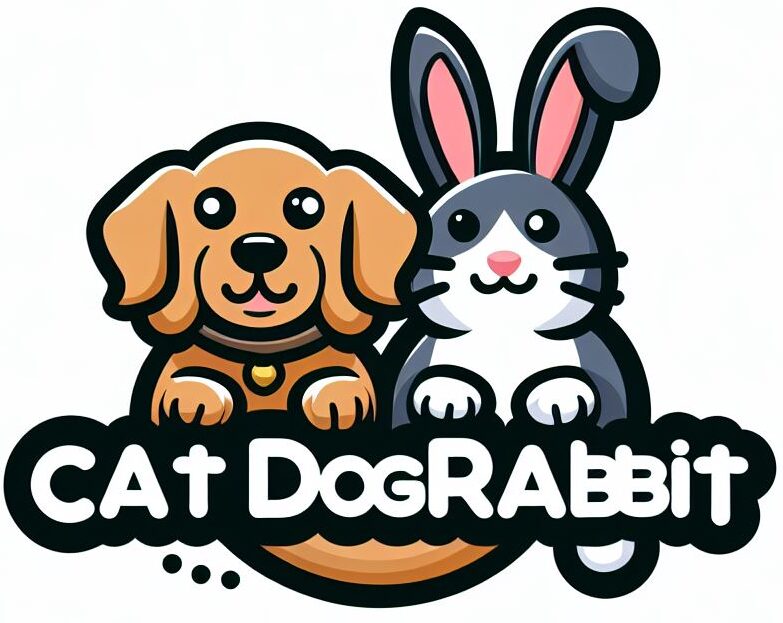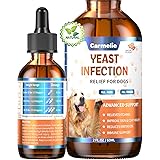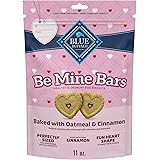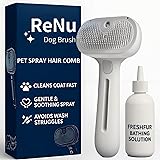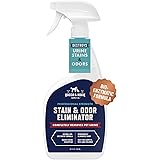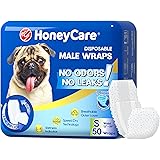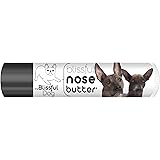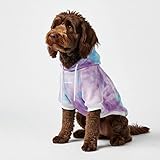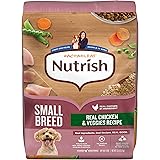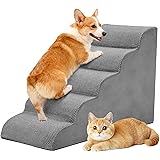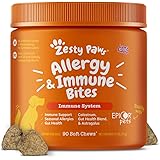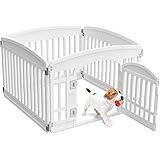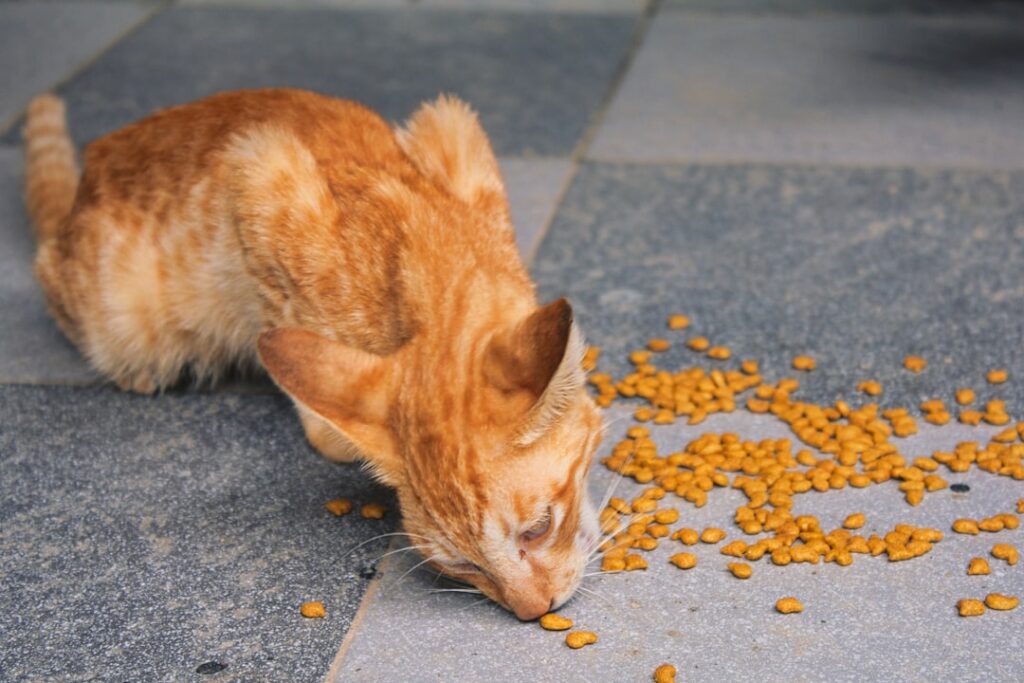
Carmelie Natural Yeast Relief for Dogs, Support Healthy Itch Relief, Ear Paw Discomfort Care, Itch Relief for Dog, Allergy Supports, Inflammation Relief for Dogs, 60ml Bacon Flavor
$17.89 (as of 02/09/2026 23:09 GMT +00:00 - More infoProduct prices and availability are accurate as of the date/time indicated and are subject to change. Any price and availability information displayed on [relevant Amazon Site(s), as applicable] at the time of purchase will apply to the purchase of this product.)Blue Buffalo Be Mine Bars Heart-Shaped Healthy & Crunchy Dog Biscuits, Natural Valentine’s Dog Treats, Baked with Oatmeal & Cinnamon, 11-oz Bag
$4.99 (as of 02/09/2026 23:09 GMT +00:00 - More infoProduct prices and availability are accurate as of the date/time indicated and are subject to change. Any price and availability information displayed on [relevant Amazon Site(s), as applicable] at the time of purchase will apply to the purchase of this product.)Renu Dog Brush - 3-in-1 Self-Cleaning Steamy Pet Brush for Dogs & Cats, Fresh Fur Shower Brush That Removes Loose Hair, Reduces Shedding, Grooming Tool for Long & Short Hair, Wet or Dry Use (White)
$15.99 (as of 02/09/2026 23:09 GMT +00:00 - More infoProduct prices and availability are accurate as of the date/time indicated and are subject to change. Any price and availability information displayed on [relevant Amazon Site(s), as applicable] at the time of purchase will apply to the purchase of this product.)Rocco & Roxie Supply Co. Stain & Strong Odor Eliminator, Enzyme Cleaner, Pet Odor Eliminator for Home - Carpet Stain Remover for Cats & Dog Pee - Urine Destroyer - Carpet Cleaner Spray Clear, 32 Fl Oz
$23.92 (as of 02/09/2026 23:09 GMT +00:00 - More infoProduct prices and availability are accurate as of the date/time indicated and are subject to change. Any price and availability information displayed on [relevant Amazon Site(s), as applicable] at the time of purchase will apply to the purchase of this product.)HONEY CARE All-Absorb A26 Male Dog Wrap, 50 Count, Small
$17.29 (as of 02/09/2026 23:09 GMT +00:00 - More infoProduct prices and availability are accurate as of the date/time indicated and are subject to change. Any price and availability information displayed on [relevant Amazon Site(s), as applicable] at the time of purchase will apply to the purchase of this product.)The Blissful Dog Xoloitzcuintli Nose Butter, Versatile Dog Nose Balm for Dry Nose, Handcrafted Nose Moisturizer, Easy-to-Apply Dog Essentials, Unscented, 0.15 oz.
$6.99 (as of 02/09/2026 23:09 GMT +00:00 - More infoProduct prices and availability are accurate as of the date/time indicated and are subject to change. Any price and availability information displayed on [relevant Amazon Site(s), as applicable] at the time of purchase will apply to the purchase of this product.)Purina ONE Dry Dog Food Lamb and Rice Formula - 31.1 lb. Bag
$48.98 (as of 02/09/2026 23:09 GMT +00:00 - More infoProduct prices and availability are accurate as of the date/time indicated and are subject to change. Any price and availability information displayed on [relevant Amazon Site(s), as applicable] at the time of purchase will apply to the purchase of this product.)Spark Paws Dog Hoodie – Premium Dog Sweater for Small, Medium, and Large Dogs | Warm Outfits for French Bulldogs, Pitbull, Puppy, Winter Jacket Alternative - 90s Retro Sky Dye - 2XL
$25.99 (as of 02/09/2026 23:09 GMT +00:00 - More infoProduct prices and availability are accurate as of the date/time indicated and are subject to change. Any price and availability information displayed on [relevant Amazon Site(s), as applicable] at the time of purchase will apply to the purchase of this product.)DreamBone Twist Sticks, Made With Real Chicken, Rawhide-Free Chews for Dogs, 50 Count
$8.39 (as of 02/09/2026 23:09 GMT +00:00 - More infoProduct prices and availability are accurate as of the date/time indicated and are subject to change. Any price and availability information displayed on [relevant Amazon Site(s), as applicable] at the time of purchase will apply to the purchase of this product.)Nutrition plays a crucial role in the overall health and well-being of our feline friends. Just like humans, cats require a balanced diet to thrive and prevent health problems. Feline-friendly foods are specifically formulated to meet the nutritional needs of cats, providing them with the essential nutrients they need to stay healthy and happy.
Feline-friendly foods are designed to mimic the natural diet of cats, which consists primarily of meat. These foods are typically high in protein and low in carbohydrates, as cats are obligate carnivores and have specific dietary requirements. They also contain essential vitamins, minerals, and fatty acids that are necessary for a cat’s overall health.
Key Takeaways
- Feline-friendly foods are essential for keeping your cat healthy and happy.
- A balanced diet is crucial for cats to maintain optimal health and prevent health issues.
- Some human foods are safe for cats, but others can be harmful and should be avoided.
- Understanding your cat’s nutritional needs is important for choosing the right food and avoiding health problems.
- Homemade cat food recipes and raw food diets can be beneficial, but it’s important to choose the right commercial cat food and transition your cat to a new diet gradually.
The Importance of a Balanced Diet for Cats
A balanced diet is essential for cats to maintain optimal health. Cats require certain nutrients that are only found in animal tissues, such as taurine, arachidonic acid, and vitamin A. These nutrients are crucial for their vision, heart health, immune function, and overall well-being.
A lack of these essential nutrients can lead to serious health problems in cats. For example, a deficiency in taurine can cause heart disease and blindness, while a lack of arachidonic acid can lead to skin and coat issues. Providing a balanced diet that meets all of a cat’s nutritional needs can help prevent these health problems and ensure that they live a long and healthy life.
Common Human Foods That Are Safe for Cats
While it’s important to feed cats a diet specifically formulated for their nutritional needs, there are some human foods that can be safely incorporated into their diet in moderation. These foods can provide additional nutrients and variety to their meals.
Some common human foods that are safe for cats include cooked chicken, turkey, and lean meats. These protein sources can be added to their regular cat food or served as an occasional treat. Other safe options include cooked eggs, plain yogurt, and small amounts of fruits and vegetables such as blueberries, pumpkin, and carrots.
Incorporating these human foods into a cat’s diet can provide them with additional nutrients and variety. However, it’s important to remember that these foods should only be given in moderation and should not make up a significant portion of their diet.
Foods That Cats Should Avoid
| Foods That Cats Should Avoid | Reasons |
|---|---|
| Chocolate | Contains theobromine which can cause vomiting, diarrhea, seizures and even death in cats |
| Caffeine | Can cause restlessness, rapid breathing, heart palpitations and muscle tremors in cats |
| Onions and Garlic | Can damage a cat’s red blood cells and cause anemia |
| Grapes and Raisins | Can cause kidney failure in cats |
| Alcohol | Can cause vomiting, diarrhea, difficulty breathing, tremors and even coma in cats |
| Raw Eggs | Can cause salmonella poisoning in cats |
| Raw Meat and Fish | Can contain bacteria and parasites that can cause vomiting, diarrhea and other health problems in cats |
| Dairy Products | Many cats are lactose intolerant and can experience digestive upset if they consume dairy products |
While there are some human foods that are safe for cats, there are also many foods that can be toxic to them. It’s important to be aware of these foods and ensure that they are kept out of your cat’s reach.
Some common foods that are toxic to cats include chocolate, onions, garlic, grapes, raisins, alcohol, caffeine, and certain artificial sweeteners such as xylitol. These foods can cause a range of health problems in cats, including gastrointestinal upset, kidney failure, liver damage, and even death.
It’s important to be vigilant and keep these foods out of your cat’s reach to prevent accidental ingestion. If you suspect that your cat has ingested something toxic, it’s important to contact your veterinarian immediately for guidance.
Understanding Your Cat’s Nutritional Needs
Every cat is unique and has different nutritional needs based on factors such as age, weight, and activity level. Understanding these needs is crucial for providing them with the appropriate amount of food and ensuring that they receive all the necessary nutrients.
Kittens have different nutritional needs than adult cats, as they are growing rapidly and require more calories and nutrients. Senior cats may have different dietary requirements as well, as their metabolism slows down and they may have specific health concerns.
In addition to age, a cat’s weight and activity level also play a role in determining their nutritional needs. Overweight cats may require a calorie-restricted diet to help them lose weight, while active cats may need more calories to support their energy levels.
To determine the appropriate amount of food to feed your cat, it’s best to consult with your veterinarian. They can provide guidance based on your cat’s specific needs and help you create a feeding plan that meets their nutritional requirements.
Homemade Cat Food Recipes

Making your own cat food can be a great way to ensure that your feline friend is getting a nutritious and balanced diet. Homemade cat food allows you to have control over the ingredients and quality of the food, and it can also be more cost-effective in the long run.
When making homemade cat food, it’s important to include a variety of protein sources, such as chicken, turkey, or fish. These protein sources should be cooked thoroughly to eliminate any potential bacteria or parasites. It’s also important to include a source of fat, such as fish oil or chicken fat, to provide essential fatty acids.
In addition to protein and fat, homemade cat food should also include a source of carbohydrates, such as cooked rice or sweet potatoes. It’s important to note that cats have a limited ability to digest carbohydrates, so they should only make up a small portion of their diet.
It’s also important to include essential vitamins and minerals in homemade cat food. This can be achieved by adding a feline-specific vitamin and mineral supplement or by including ingredients that are naturally rich in these nutrients, such as liver or egg yolks.
The Benefits of Feeding Your Cat a Raw Food Diet
A raw food diet for cats is gaining popularity among pet owners who want to provide their feline friends with a more natural and biologically appropriate diet. Advocates of raw feeding believe that it can provide numerous benefits for cats, including improved digestion, healthier skin and coat, increased energy levels, and better dental health.
Raw feeding involves feeding cats a diet that consists primarily of raw meat, bones, and organs. This diet is thought to closely resemble the natural diet of cats in the wild, which is high in protein and low in carbohydrates.
Proponents of raw feeding believe that this diet can help prevent health problems such as obesity, diabetes, and urinary tract issues. They also argue that it can help alleviate allergies and food sensitivities in cats.
However, it’s important to note that there are potential risks associated with feeding cats a raw food diet. Raw meat can be contaminated with bacteria such as Salmonella or E. coli, which can pose a risk to both cats and their owners. It’s important to handle raw meat safely and ensure that it is sourced from reputable suppliers.
If you are considering transitioning your cat to a raw food diet, it’s best to consult with your veterinarian first. They can provide guidance on how to safely transition your cat and ensure that their nutritional needs are being met.
Choosing the Right Commercial Cat Food
Choosing the right commercial cat food is crucial for providing your feline friend with a balanced and nutritious diet. With so many options available on the market, it can be overwhelming to know which one is best for your cat.
When choosing a commercial cat food, it’s important to read the labels carefully. Look for foods that list a high-quality source of animal protein, such as chicken or fish, as the first ingredient. Avoid foods that contain fillers or by-products, as these provide little nutritional value.
It’s also important to consider the type of cat food you want to feed your cat. There are three main types of commercial cat food: dry kibble, wet canned food, and freeze-dried or dehydrated food.
Dry kibble is convenient and cost-effective, but it tends to be higher in carbohydrates and lower in moisture. Wet canned food is higher in moisture and often more palatable for cats, but it can be more expensive and spoil more quickly. Freeze-dried or dehydrated food offers a balance between convenience and nutrition, as it retains more of the natural nutrients found in raw food.
Ultimately, the best type of cat food for your feline friend will depend on their individual needs and preferences. It’s important to choose a high-quality food that meets their nutritional requirements and suits their taste.
How to Transition Your Cat to a New Diet
Transitioning your cat to a new diet can be challenging, especially if they are used to eating a certain type of food. However, with patience and persistence, it is possible to successfully transition your cat to a new diet.
When transitioning your cat to a new diet, it’s important to do so gradually. Start by mixing a small amount of the new food with their current food, gradually increasing the proportion of the new food over time. This allows your cat’s digestive system to adjust to the new diet and helps prevent gastrointestinal upset.
It’s also important to be patient during the transition process. Some cats may take longer to adjust to a new diet than others. If your cat is resistant to the new food, try offering it in different forms or flavors to see if they prefer one over the other.
If you are transitioning your cat to a raw food diet, it’s important to follow proper food safety protocols. Handle raw meat carefully and ensure that it is sourced from reputable suppliers. Gradually introduce raw food into your cat’s diet, starting with small amounts and gradually increasing over time.
Keeping Your Cat Healthy and Happy with Feline-Friendly Foods
In conclusion, nutrition plays a vital role in the health and well-being of our feline friends. Providing them with a balanced and nutritious diet is essential for preventing health problems and ensuring that they live a long and happy life.
Feline-friendly foods are specifically formulated to meet the nutritional needs of cats, providing them with the essential nutrients they need to thrive. In addition to commercial cat foods, there are also safe human foods that can be incorporated into a cat’s diet in moderation.
Whether you choose to feed your cat a commercial cat food, make your own homemade cat food, or transition them to a raw food diet, it’s important to consult with your veterinarian and ensure that their nutritional needs are being met. By providing your cat with a feline-friendly diet, you can help keep them healthy and happy for years to come.
FAQs
What are some human foods that cats can eat?
Some human foods that cats can eat include cooked meat, fish, eggs, and vegetables such as carrots and green beans.
What human foods should cats avoid?
Cats should avoid foods such as chocolate, caffeine, alcohol, onions, garlic, and grapes/raisins as they can be toxic to cats.
Can cats eat dairy products?
While some cats can tolerate small amounts of dairy products, most cats are lactose intolerant and should avoid dairy altogether.
Can cats eat fruits?
Cats can eat some fruits such as bananas, blueberries, and watermelon in small amounts. However, fruits should not make up a significant portion of a cat’s diet.
Can cats eat raw meat?
Cats can eat raw meat, but it is not recommended as it can contain harmful bacteria that can make cats sick. Cooked meat is a safer option.
What should I do if my cat eats something they shouldn’t?
If your cat eats something they shouldn’t, contact your veterinarian immediately. Some foods can be toxic to cats and can cause serious health problems if not treated promptly.
